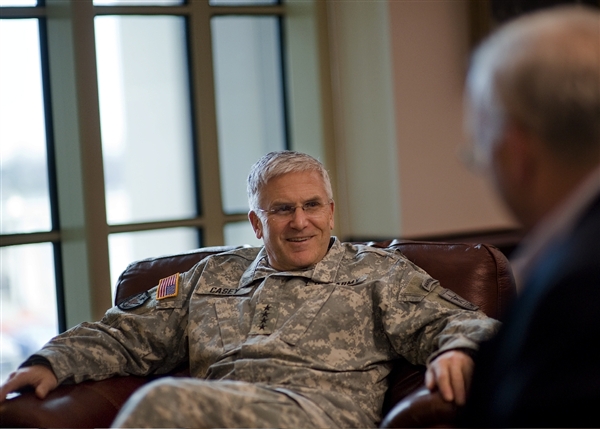WASHINGTON, March 8, 2011 — As the men and women who serve in today’s military leave active duty, communities around the country should tap their potential as employees for the benefit of the nation, the top U.S. military officer said yesterday.
Navy Adm. Mike Mullen, chairman of the Joint Chiefs of Staff, addressed hundreds of participants at a meeting here of the National Association of Counties, which provides essential services to the United States’ 3,068 counties.
Mullen characterized those fighting the wars in Afghanistan and Iraq as “a generation wired to serve.”
“What I’m asking communities to do throughout the country is to recognize … that they are coming home, recognize that they will be able to deliver a huge upside potential, and in welcoming them back, create a bridge as they transition from this military experience to the experience back home,” the admiral said.
Mullen also praised the association for its initiatives in support of service members and their families. Its president, Glen Whitley, created a Veterans and Military Service Task Force to encourage association members to promote innovative programs, services and benefits.
“Counties should do what they can to meet the diverse needs of our veterans,” Whitley said in a recent announcement, “and work hard to help service members and families successfully transition after deployment.”
In April, the theme of National County Government Month will be “Serving Our Veterans, Armed Forces and their Families.”
Mullen described the decades-old transition process of service members from the Defense Department to the Veterans Affairs Department and back to their communities. Priorities for these returning service members are education, health care and employment, he said.
“I think once you tap it, once you get into creating opportunities for these young men and women, they will continue to serve for decades to come,” Mullen said.
“That’s not to say that these young men and women won’t bring challenges,” the chairman acknowledged, noting that tens of thousands who have been in combat bring back physical wounds and the challenge of post-traumatic stress.
“We’re going to have to work our way through meeting some of those mental health challenges,” he said, “and we can only do this together.”
Such efforts take “inspired local leadership,” Mullen said, and must be “customized to each community throughout the country, whether it’s a city, a town, whether it’s rural or urban.”
“It takes leaders who understand their own communities to create the kind of structure that would identify and work to create opportunities to tap this potential,” he added.
“DOD, VA and you,” Mullen told the audience, can make a difference for young men and women and their families who have made such a difference for the nation.
“I’m looking for local leadership in your counties willing to take this on,” he said, “tied to the initiative you’ve put in place.”
Source:
U.S. Department of Defense
Office of the Assistant Secretary of Defense (Public Affairs)

 von
von 